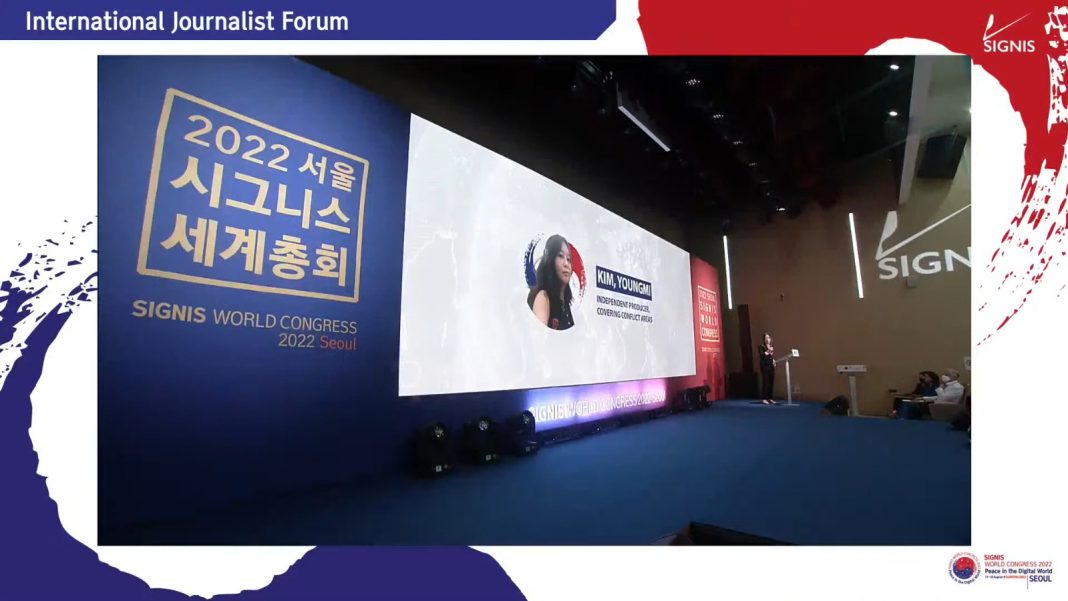During the SIGNIS World Congress 2022, held under the theme “Peace in the Digital World”, we explored the themes of global wars and the culture of friction, and hate in the digital world towards the tasks journalists must undertake to support peace.
At the International Journalists Forum, we had the honor of interviewing Ms. Young-mi Kim, Korea’s leading war zone reporter, who records and delivers the news to the Korean people who harbor pains from the Korean War and as a divided country. With her, we had the chance to talk about the role that journalists must play for the common good within the history of ongoing conflicts from someone who has been there. In a poignant speech addressing the civilian impact of the war in Ukraine, war journalist Young-mi Kim highlighted the devastating consequences faced by ordinary Ukrainian citizens. Yulia, a 38-year-old housewife and office worker in Kyiv, lost her dream apartment in a bombing, while others lost their recently paid-off cars and the opportunity for higher education. With fathers conscripted and mothers forced to cross borders with their children, families were torn apart, leaving the elderly unable to evacuate due to physical limitations. The emotional toll was palpable, as seen in a heart-wrenching video call between a reporter and his grandmother. Kim emphasized that the damage inflicted by war extends beyond ideological perspectives, encompassing the tragic stories of civilians caught in the crossfire. Amidst such tragedy, she questioned where these individuals can turn to seek justice and appeal for help. Kim asserted that wars persist due to the silence of citizens regarding unjust conflicts worldwide. Citing the ongoing Syrian civil war, she pointed out that the indifference of the global media and citizens has allowed the conflict to endure for over a decade. The close ties between the Syrian government and Russia, with the latter deploying its air force, have further complicated the situation. Kim emphasized that in today’s digital age, marked by the power of the internet, it is easier than ever to make one’s voice heard and spread awareness. Drawing parallels to the Jasmine Revolution and the continued criticism of the Myanmar military by citizens through social media, she stressed the importance of utilizing advanced technologies to shed light on tragic war stories. She urged individuals to empathize with the sacrifices made by others and recognize that such tragedies could befall anyone, motivating them to speak out for justice. Despite these technological advancements, Kim expressed concern that silence prevails when it comes to addressing unjust wars and sacrifices. Having witnessed countless deaths firsthand, Kim emphasized the value and preciousness of every life affected by war. She highlighted the need to reject violence and imprint the proposition that violence should never be tolerated by anyone at any time onto the media and global citizens. Reflecting on the failures of the international community in preventing civil and international wars, including the war in Ukraine and the military dictatorship in Myanmar, Kim stressed that it is not too late to take action. She called for thorough investigations into events like the Bucha massacre in Ukraine and the pursuit of justice for the perpetrators. Additionally, she emphasized the importance of imposing international sanctions on Myanmar’s junta for their oppression of democratic forces. The systems in place, such as the International Criminal Court (ICC) and the Geneva Conventions, provide avenues to protect the human rights of civilians in war. Kim implored the media and citizens to operate within this system of peace, which is a legacy passed down from ancestors. She considered it the dignity of humanity to make immediate efforts to halt violence and minimize civilian casualties, ensuring a peaceful future for the next generation.


